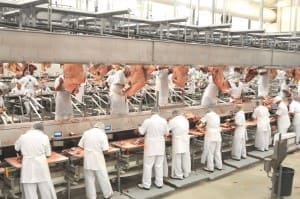MEATWORKERS across Australia are now receiving their first-round COVID vaccinations, in a move designed to ensure that high-risk abattoir environments do not re-emerge as cluster hot-spots as they did during 2020.
This time last year, the meat processing industry around the world started to emerge as a heightened risk of COVID infection, due to working conditions including the cold operating environment and close-quarters work-stations conducive to disease spread.
 At the height of the first wave episode in May last year, around 40 percent of US meat processing capacity was knocked out, due to waves of infections and deaths among plant staff.
At the height of the first wave episode in May last year, around 40 percent of US meat processing capacity was knocked out, due to waves of infections and deaths among plant staff.
The closures and restricted operating conditions led to a massive, but somewhat brief spike in demand for Australian imported beef, as evidenced in this MLA graph.
Australian processing was much less seriously impacted, but there were still a number of high-profile plant closures and reductions in processing throughput, especially in Victoria, during the first wave.
In Australia, meatworkers are classified under the COVID vaccination schedule as category 1B, for people in essential services, now eligible for vaccination.
Victoria has led the response, with workers at sites like Colac and Midfield Warnambool receiving their first jabs a fortnight ago. Other states have also started vaccinating meatworks staff, with a number of Queensland and NSW plants starting their programs last week. Variations in approach by different state governments mean that vaccination programs are at different stages around the country, Beef Central was told.
Typical of processor responses this month, Teys Australia said it was supportive of the vaccination rollout plan that can further protect staff, and the company’s supply chain as an essential service to the Australian community.
“Teys continues to work closely with all arms of government and stay abreast of any relevant changes as COVID-19 management protocols continue to evolve,” the company said in a statement.
“Our people play a critical role in the supply chain of an essential industry, and we are always focused on the health and safety of our people. Protecting them is a top priority. The vaccination rollout is consistent with that focus, and Teys is fully supportive of measures that protect the health of our workforce and, in doing so, reduce the risk of business disruption to a critical supply chain.”
Whilst fully supportive of the vaccination rollout, Teys said it would not be mandating that staff receive a vaccination. “The decision is personal and voluntary,” the company said.
“In line with our current process for annual flu vaccinations, we will encourage our workforce to consider receiving the COVID vaccination, and encourage them to seek further information from their regular doctor, or a vaccination clinic if they have questions.”
However the company said that in line with take-up rates for the annual flu vaccination program offered to employees, it expects that the take-up rate for the COVID-19 vaccination – free of charge to staff – will be strong.
Teys Australia issued a statement yesterday advising that the company’s Biloela plant will continue to operate with a lower throughput, while employee contact tracing exercises are conducted in relation to a person in Gladstone. This is to ensure that Biloela continues to operate uninterrupted.
“While there has been no direct contact with our employees, Queensland Health has advised that they are required to stay home and get tested,” Teys said. “These actions are being taken out of an abundance of caution to ensure worker and community safety. Teys has always adopted a proactive strategy that puts the safety of our employees and the local community first.”
Some Australian processors have urged that ‘on-site’ vaccination booths be established at processing plants, to allow for more convenient, rapid, mass treatment. Some Australian abattoirs employ 1000 staff or more on individual sites.
US response
A year after the virus was first reported among US meatworkers, the North American Meat Institute last week issued a statement saying that comprehensive protection had brought case rates to just 2.67 cases per day per 100,000 workers – more than 85pc lower than rates in the general US population, and more than 98pc lower than the May 2020 peak in the processing sector when it reached 98.39 cases per day per 100,000 workers.
“Frontline meat and poultry workers were among the first impacted by the pandemic, but comprehensive protections implemented in the sector since spring 2020 work,” Institute CEO Julie Anna Potts said in a release.
“The critical next step is to ensure immediate access to vaccines as this dedicated and diverse workforce continues feeding Americans and keeping our farm economy working.”
According to data from the US Food and Environment Reporting Network, there were just 4.81 new reported cases per 100,000 US meat and poultry workers per day in February 2021, compared with 26.15 cases per 100,000 people in the general US population over the same period.
A February 2021 Meat Institute survey of more than 250 US meat facilities employing more than 150,000 workers found broad implementation of multi-layered COVID-19 protections including:
- COVID-19 hazard assessments; designated COVID-19 coordinators
- Entry screening measures and controls
- Increased sanitation and disinfection practices
- Training and education materials on COVID-19 symptoms and prevention, in multiple languages
- Mandatory face coverings
- Increased flexibility in leave policies
- Physical barriers in food production and other areas (e.g., break rooms, cafeterias)
Australian meat processors have adopted more or less identical control measures, Beef Central was told.
